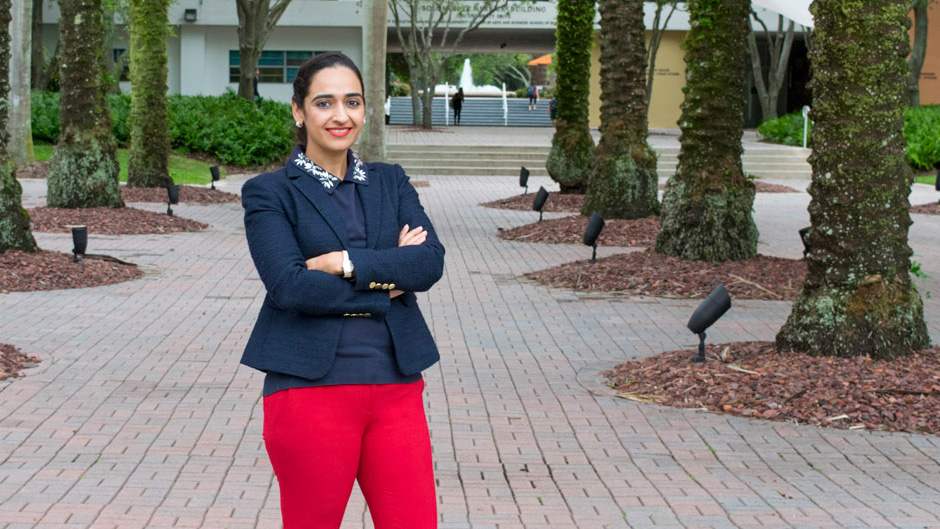As she started her Psychosocial Well-Being class online in the middle of the spring semester, Ashmeet Oberoi, assistant professor of professional practice at the University of Miami School of Education and Human Development, asked all her students how they were doing and whether or not anything had changed since their last class.
One student revealed that she was the caretaker of two relatives who lived with her and that it may be difficult for her to remain throughout the entire class.
Oberoi said she understood and thanked the student for feeling comfortable to share that information.
Compassionate. Transparent. Kind.
These words are often used to describe Oberoi. She is the director of the Community and Social Change master’s degree program and believes that treating students like they have a full life outside the classroom is crucial and enhances the academic experience.
“Someone once told me that as a teacher one can either be respected or liked,” said Oberoi. “That did not sound right to me. I wanted a third option. The third option is leading with care and compassionate understanding.”
She opted for the third option and it has paid off. This year she was named the recipient of the University’s Excellence in Civic Engagement Award for her outstanding work in engaging students through academic service-learning courses and community-based research. She was also nominated by her graduate students for the Faculty Mentor of the Year award by the Graduate School.
“Dr. Oberoi’s dedication to ensuring her students learning is exemplary,” said Laura Kohn Wood, dean of the School of Education and Human Development. “She reflects the best of the values of the field of community psychology. And that is to ensure that research and learning is relevant for addressing real-world problems and training students to develop a tool kit for enhancing individual and community well-being.”
Born in New Delhi, India, Oberoi grew up in a middle-class family that valued education. She received both her undergraduate and graduate degrees from Lady Irwin College—Delhi University.
But it was her immigration to Chicago, Illinois, with her husband that defined her and set her on the road to issues of social justice.
“I thought I was very secure in myself and sure of what I was, but a lot of the experiences challenged me. And I had to redefine who I was,” she said.
Several incidents in her new homeland rattled her. Oberoi took classes at Loyola University, where her husband worked, and vividly remembers how one professor would ask her to repeat everything she said, implying that her English was not understandable. When she wore some flashy jewelry with her dresses, she noticed strange glances from other classmates.
As a member of the Sikh religion, her husband wears a turban. When they were out in public, they would sometimes be openly harassed.
“This was close to the 9/11 attacks and he would be called Osama or told to go back [to his country],” she said. She also had to learn about race differences and the history of racism in the United States.
“The concept of race was foreign to me,” she said. “In India we do not have that concept. There are other identity markers such as caste, social class, and religion but not the construct of race.”
All those experiences made social justice a central theme in her life. It was also a determining factor in her decision to study community psychology for her doctoral work at the University of Illinois at Chicago. She wanted a program that integrated cultural and personal identity as part of its discipline.
Oberoi’s work at the University of Miami reflects her beliefs. She is leading an Intergroup Dialogue course on worldviews that engages students in exploring discrimination and social justice associated with religious or non-religious identities and traditions. All her classes integrate service learning and community engagement. Every semester, students work with local community organizations to complete a project that meets the needs of the group.
Jacki Altman, a graduate student, who has taken three classes with Oberoi, believes that she is an exceptional professor because she goes out of her way to help her students. One example of this is how Oberoi provides a detailed list of the skills learned in each of her classes to the students so they can add them to their résumés.
“I think professor Oberoi is very transparent and makes you feel comfortable,” she said. “She sets your mind at ease and cares about students—not only their professional well-being but their personal well-being.”

